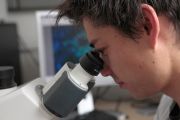Profile
Heart failure is of great significance in cardiovascular medicine based on its high incidence, morbidity and mortality rate. Unraveling underlying mechanisms is therefore of clinical and socioeconomic relevance. In the past posttranslational modifications like redox- and phosphorylation changes have been identified to be involved in the molecular mechanisms governing cardiac function. A detailed understanding of the specifically involved enzymes, redox- and phosphorylation crosstalks in different cell types from the heart and unraveling phospho-proteome and redox-proteome levels in early heart failure, however, is necessary to gain translational benefit of this research for the treatment of patients.
Detection of posttranslational modifications in the context of heart physiology and pathology is not a standard task and requires the specific experience of groups with complementary expertise. Therefore two institutions with expertise in detection and functional analysis of posttranslational mechanisms and heart failure mouse models are tied together in the International Research Training Group to focus on phosphorylation and redox signalling in the failing heart.
Principal investigators from the British Heart Foundation (BHF) Centre of Research Excellence at King´s College London and the Heart Centre Göttingen with individual expertise in this topic as well as with individual training options have identified collaborative projects which will benefit the research training unit. Within this scientific cooperation an innovative student training programme has been designed.
Bundling scientific complementary excellence in the context of posttranslational modifications in heart failure will benefit the research driven MD and PhD education.


